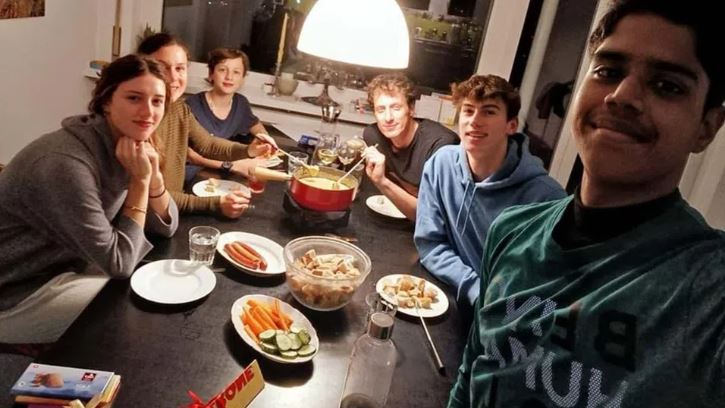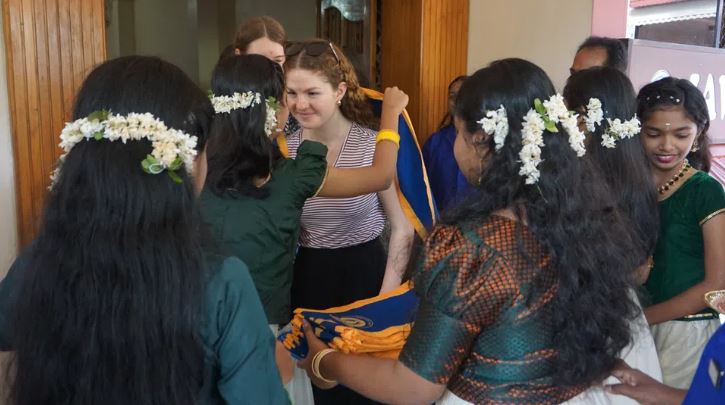
In India, Swiss students see a new way of living and thinking

For 20 teenagers from Lucerne, 2024 began in Kerala in southern India, where they were staying with host families and learning about life on the subcontinent.
Some 7,500 kilometres – as the crow flies – separate Lucerne in central Switzerland from Kerala in southern India. The cultural gulf is also vast: “I’ve had to get used to only eating with my right hand”, says Celia Kaufmann. Lana Kronenberg discovered that “going out in the evening is taboo in India”.
The two young women from the Alpenquai secondary school in Lucerne were in India along with 18 other students, with the goal of learning about the southern Asian country and gaining an insight into its political system. They also wanted to broaden their own horizons. To this end, staying with a host family was a valuable experience, Kronenberg says: “you talk together, eat together, laugh together”.
It’s the third time that a group of students from Lucerne have undertaken such a trip. Religion and ethics teacher Tommi Mendel has accompanied each time. He says that while “only a small part of what a teacher does in the classroom really sticks, participants on such exchanges draw on them throughout their life.”
When worlds collide
Until January 11, the students worked in intercultural groups to discuss facets of social inequality in both Switzerland and India. The visitors from Lucerne also saw how worlds collide in everyday life. While their host families sometimes had cooks and private chauffeurs, they also experienced far less privileged neighbourhoods.
Conversations brought up some surprising insights. “When it comes to choosing a job, women in Switzerland tend to have more trouble making a career than women in India. I wouldn’t have expected that,” says Kaufmann. There are also noticeable gender differences. “Most boys here [in India] have a mobile phone. The girls don’t – which they find pretty unfair.”
The exchange programme for the Lucerne students and their Indian counterparts is financially supported by Movetia – the national agency for exchange and mobility in Switzerland for all areas of education, which is in turn supported by the federal government and the cantons.
Movetia pays a travel allowance of CHF800 ($935) per person for the project. For the stay on site, CHF30 are paid per young person per day in India and CHF50 in Switzerland. Movetia also finances the stay of the accompanying teachers, as well as paying an organisation fee of CHF 1,250 to the secondary school in Lucerne. Students have to pay around CHF650 out of their own pockets.
Conditions
In order to qualify for financial support from the agency, a number of conditions must be met. “We don’t fund purely tourist trips,” says Susan Gürber, research assistant at Movetia. “We require that the students dedicate themselves to a topic that is relevant to school and society and also work on it together during the school year.”
Each year, a maximum of 20% of the funding for international mobility projects is channelled into non-European exchange projects. “By funding projects within Europe, we also want to take the ecological dimension into account,” says Gürber. “However, if the quality of a project’s content is convincing, we don’t draw geographical boundaries.”
Realisations were also made about the education system. “For my host sister it’s hugely important to be well-educated and to get into a good university,” Kronenberg says. Such pressure to perform is less obvious in Switzerland, where the alternative to academic study is to do an apprenticeship.
However, one thing the youths also noticed: whether career, family, or climate change, the same issues worry their generation on both sides of the geographic gulf.
12-hour flight
It wasn’t only the Swiss students who took to the skies for the exchange: in October their Indian counterparts visited Lucerne. Between these visits they also met in a virtual classroom via Skype.
But at a time of global warming, should such a project not be done fully digitally – or at least with a trip confined to within Europe’s borders?

Tommi Mendel defends the distant travel. “Thinking patterns in western industrialised nations are very similar,” he says. In India on the other hand there is huge religious, cultural and linguistic diversity.
“Sustainability and climate change are important issues, which we also reflect on,” he says. But it’s too easy to point the finger merely at long-haul flights.
Food, consumer habits, living patterns and mobility also need to be considered. “And everyone sees it as a given that they can own a smartphone and a laptop,” Mendel says. Such objects also cause CO2 emissions. “When you take a critical look at the whole context, then such a once-off exchange programme can be justified.”
Translated from German by Domhnall O’Sullivan

In compliance with the JTI standards
More: SWI swissinfo.ch certified by the Journalism Trust Initiative


























You can find an overview of ongoing debates with our journalists here . Please join us!
If you want to start a conversation about a topic raised in this article or want to report factual errors, email us at english@swissinfo.ch.